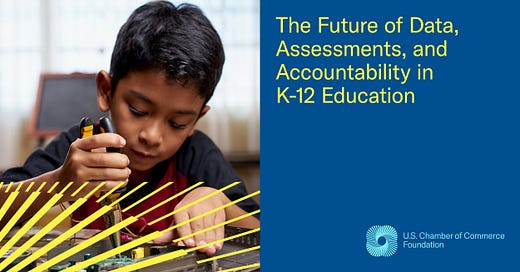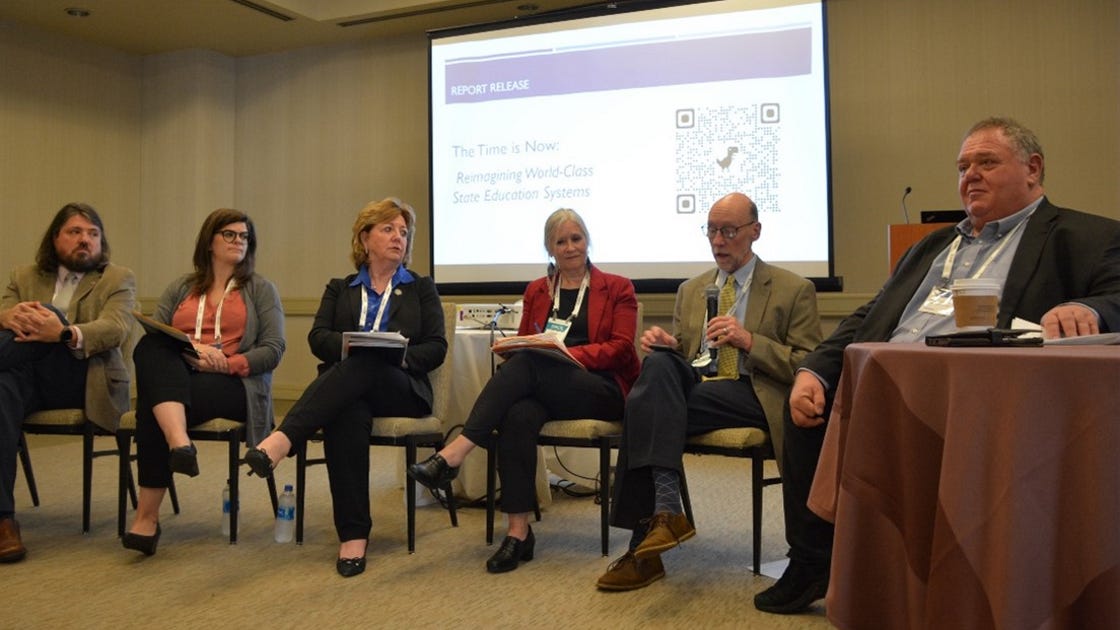Accountabilty is a driving force behind my work in education policy stemming from my days preparing third graders for the end-of-year state tests in North Carolina. I currently serve on a working group with the U.S. Chamber of Commerce Foundation on the Future of Data, Assessments, and Accountability in K-12 Education. This is an important effort to improve the use of data, assessments, and accountability in education.
This month we launched a Design Challenge to unearth the best thinking from experts on the use of data as a tool for school improvement and accountability. The U.S. Chamber of Commerce Foundation is looking for submissions that define the problem, identify potential changes, and propose innovative policy solutions to gather insights from the field:
Many of these solutions will be published for visibility, and cash prizes will be awarded to top contenders.
Upon selection for a second review, the top 20 entrants will receive a cash prize of $5,000.
From this group, the top six will present to the Future of Data Working Group at a public event, currently scheduled to be held in June 2023, and receive a cash prize of $30,000.
Submissions are due February 24, 2023
Learn more about the Future of Data initiative and the submission process.
THE WEEKS AHEAD
Tuesday, December 20, 2022, at 2:00 PM EST, the Campaign for. Grade Level Reading is hosting a rebroadcast of their NAEP conversations. Register here.
ASSESSMENT AND ACCOUNTABILITY
A new study found that monitoring specific indicators by age group may help schools meet state accountability thresholds [REL].
A new report highlights how states are and are not improving their data reporting [ERN].
New national data from fall 2022 NWEA MAP Growth scores reveals that the summer 2022 learning trajectories improved overall [The74].
A new CALDER study brings to light the need for urgency around systemic “catch-up” for all US students [The74].
A new resource helps families assess early-grade reading skills at home and provides activities that can fit into family routines [CBM Measures].
“As many as 1 million students who met college and career-ready math standards in third grade are now off track,” according to an article that compares grade versus cohort data trends [The74].
FEDERAL EDUCATION POLICY
Congress proposes a national minimum teacher salary [EdSurge].
Jill Biden talks with union leaders at the White House [EdNext].
ED released updated guidance on ESSER spending [USED].
USED’s Office of Civil Rights says that Davis Joint Unified School District in California is in a resolution agreement to ensure that restraint and seclusion policies adhere to a free appropriate public education (FAPE) for all students [USED].
All4Ed asks stakeholders to sign an ask for Congress to fund the Emergency Connectivity Fund to address the longstanding digital divide [All4Ed].
FAMILY RESOURCES & ENGAGEMENT
Idaho state board provides grants to parents for purchasing education-related supports like technology, instructional materials, and tutoring and therapy services [ID].
Researchers call on policymakers to ensure families are empowered through programs established for Covid-19 relief [Brookings].
The Denver School Board seeks family and student input on the new data dashboard [Chalkbeat].
Parents are used as pawns in unraveling culture wars, and ED eliminates the newly formed parent council [The74].
Minnesota leads the way with new recovery dashboard and underlying theory of action [The74].
WORKFORCE ISSUES
NCES released the 2020-21 National Teacher and Principal Survey data for schools, principals, and teachers [NCES].
Public K–12 school principals spent an average of 58.3 hours per week on all school-related activities.4 On average, public school principals spent about 30 percent of their time on internal administrative tasks, 29 percent on curriculum and teaching-related tasks, 24 percent on student interactions, and 15 percent on parent interactions.
Poor data quality impacts how states and districts can respond to the local teacher workforce challenges [NCTQ].
New October data from the NCES school experiences survey shows that four percent of all public school teaching positions were vacant [NCES].
Eighty-three percent of public schools reported having experienced procurement challenges that appeared to result from supply-chain disruptions during the 2022–23 school year.
POSTSECONDARY EDUCATION
Declining enrollment trends in higher education bring new changes to the field [Axios].
A new report provides evidence that state supports for remedial education in community colleges in Colorado led to increased graduation rates [Chalkbeat].
Wisconsin Technical College System enrollment increased by more than 10% this year [WPR].
EDUCATION FINANCE
A new study finds that districts serving communities with higher levels of poverty receive lower credit score ratings and thus face higher costs to borrow for capital improvements — leading, ultimately, to lower capital spending [Brookings].
Burbio started tracking changes to ESSER III spending plans. They’ve highlighted some initial findings [Burbio].
According to a new report from the National Association of State Budget Officers, state leaders expect spending to increase by 7% next year [Plurbius].
READING EDUCATION
Jocelyn writes about how states implement the science of reading policy [CurriculumHQ].
An Ohio bill attempts to end the third-grade reading retention requirements and has backing from education groups [OH].
STUDENT WELL BEING
Each year, states introduce hundreds of bills on school safety. Check out the latest landscape analysis of what these policies contain [ECS].
NASBE released a brief that covers how schools address the prevention of alcohol or drug use and abuse through education curricula [NASBE].
NATIONAL EDUCATION POLICY
A bipartisan group of legislators studied world-class education systems from across the globe and developed a series of recommendations for their peers [NCSL].
“As legislators, we can create the enabling policy framework for district leaders, educators, and students to learn from the best, do their best work, innovate and adapt to the demands of an economy on the move.”
ICYMI
FutureEd hosted a “real talk” webinar about teacher shortages and current tensions underlying assumptions the profession. You can watch a recording of the webinar here.
Dr. Christine M. T. Pitts serves as Director of Impact and Communications at the Center on Reinventing ic Education, overseeing policy leadership and external affairs. A teacher and researcher by training, she previously led research and evaluation for Portland Public Schools. She served as Policy Advisor at NWEA, overseeing state and federal policy to advance equity and innovation in educational assessment. Follow her on Twitter and Instagram @cmtpitts.









